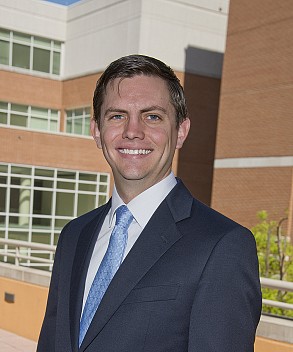
Before enrolling in Georgia Tech’s MBA Program, Brian Edgerton had long been interested in sustainability.
Before enrolling in Georgia Tech’s MBA Program, Brian Edgerton had long been interested in sustainability. “But when I came to Tech, I had the opportunity to embrace it,” he says.
Edgerton, MBA 2013, served as president of Georgia Tech’s Net Impact chapter during his studies. The Tech chapter, which earned Gold Standing from the national organization in 2013, is one of more than 300 worldwide, including 40,000 students and professional leaders who are focused on creating positive social and environmental change in the workplace and around the world.
Now a business user coordinator in distribution at Target’s headquarters in Minneapolis, Minnesota, Edgerton gained insight into sustainability-related careers while attending Net Impact’s national conference.
“As I listened to a panel discussion, I realized that none of the experts entered their companies in a sustainability role,” he says. “You don’t necessarily have to find a sustainability position right away, but you can find a corporate culture aligned with your values and build relationships there to influence change as your role evolves. Sustainability is a holistic process.”
Attracted to Target by its community impact and environmental initiatives, Edgerton worked as a project engineer for Polytron before joining Tech’s full-time MBA program in 2011. He previously earned his BS in Electrical Engineering from Tech in 2006.
“I had a gut feel that the culture of the Tech MBA was what I needed,” says the native of Charlotte, N.C. “It has a strong sense of community and is consistently highly ranked in operations.”
Edgerton, who focused his MBA studies on both operations and strategy, won the Dean’s Prize for Full-time MBA Student Excellence at the end of his second year.
During the MBA program, he served as a graduate research assistant for Scheller College’s Institute for Leadership and Entrepreneurship, which enabled him to assist with initiatives focused on values-based business practices and socially responsible entrepreneurship, including the Ideas to Serve Competition and Global Social Venture Competition.
He was excited about the founding of the Center for Business Strategies for Sustainability during his time in the MBA program. He particularly enjoyed the Business Strategies for Sustainabilitycourse taught by Center founder Beril Toktay, professor of operations management and holder of the Brady Family Chair.
The course included an innovation tournament, in which students generated business-model or product ideas that would have a positive environmental or social impact. Edgerton’s concept was a for-profit food-truck business that would deliver fresh produce and prepared meals to people living in “food deserts,” which are often low-income communities where nutritious food is difficult to obtain.
